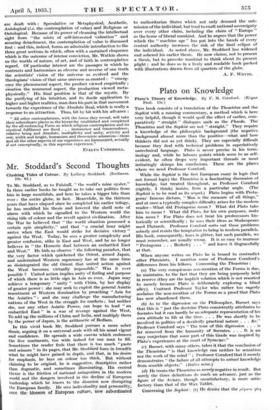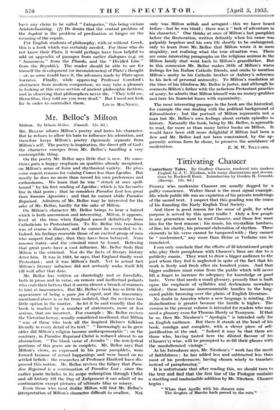Plato on Knowledge This book consists of a translation of
the Theactetus and the Sophist with a running commentary, a method which is here very helpful, though it would spoil,the effect of earlier, com- paratively " straight " dialogues such as the Phaedo. The Theactetus and the Sophist are not "straight." They require a knowledge of the philosophic background (the negative background almost more than the positive—what and how thinkers did not as yet think). They are especially difficult because they deal with technical problems in superlatively tudeelmical language. Plato is never precise in his term- inology and, while he labours points which seem to us self- evident, he often drops very important threads or most irritatingly skimps his conclusions. These are the places where we need Professor Cornford.
While the Sophist is the first European essay in logic (but not formal logic) the Theaetetus is a fascinating discussion of knowledge, but treated throughout, as Professor Cornford (rightly, I think) insists, from a particular angle. (The Sophist is to be read as its sequel.) Plato begins with Prota- goras' famous dictum, "Man is the measure of all things," and at once a typically complex difficulty arises for the modern reader—What did Protagoras mean ? What did Plato take him to mean ? What did Plato, for his own purposes, make him mean ? For Plato does not treat his predecessors his- torically or scientifically ; he uses their ideas as Shakespeare used Plutarch. Professor Cornford sorts out these problems soberly and resists the temptation to bring in modern parallels. His book, consequently, loses in glitter, but such parallels, we must remember, are usually wrong. It is so easy to murmur " Protagoras . . . Berkeley . . . " and leave it disgracefully at that.
When anyone writes on Plato he is bound to contradict other Platonists. I mention sonic of Professor C,ornford's differences from his fellows. Concerning the Theaetetus : (a) The very conspicuous non-mention of the Forms is due, he maintains, to the fact that they are being purposely held in reserve (they are the implicit solution which is not resorted to merely because Plato is deliberately exploring a blind alley). Contrast Professor Taylor, who rather too eagerly acclaims the non-mention of the Forms as a proof that Plato has now abandoned them.
(b) As to the digression on the Philosopher, Burnet says that this is "just the doctrine Plato consistently attributes to Socrates but it can hardly be an adequate representation of his Own attitude to life at the time. . . . He was shortly to be involved in politics of a decidedly practical nature'. . . &c." Professor Cornford says "The tone of this digression . . . is far removed from the humanity of Socrates. . . . It is an easy conjecture that some part of this tirade was inspired by Plato's experiences at the court of Syracuse."
(c) Burnet, with many others, takes it that the conclusion of the Theaeletus "is that knowledge can neither be sensation nor the work of the mind " ; Professor Cornford that it merely, demonstrates "the failure of all attempts to extract knowledge from sensible objects." (Italics mine.) (d) He treats the Theaeletus as merely negative in result. But surely the three definitions do mark an advance, just as the figure of the Aviary, though unsatisfactory, is more satis- factory than that of the Wax Tablet.
Concerning the Sophist : (e) He denies that the p./7Loya 719
have any claim to be called "Categories," this being vicious Aristotelianizing. (f) He denies that the central problem of the Sophist is the problem of predication or hinges on the meaning of the copula.
For English students of philosophy, with or without Greek, this is a book which was certainly needed. For those who do not know their Plato, it would perhaps have been helpful to add an appendix of passages from earlier dialogues (e.g. on Anamnesis " from the Phaedo, and the "Divided Line" from the Republic). The reader should be able to see for himself the development (or inconsistencies) of Plato's thought —or, as some would have it, the advances made by Plato upon Socrates. Finally, while approving Professor Cornford's abstinence from modern comparison, we may take a pleasure in looking at this cross-section of ancient philosophic factions, and in observing that philosophers never die. "They told me, Heraelitus, they told me you were dead." But I need not look far in order to contradict them.
LOUIS MACSEICE.











































 Previous page
Previous page